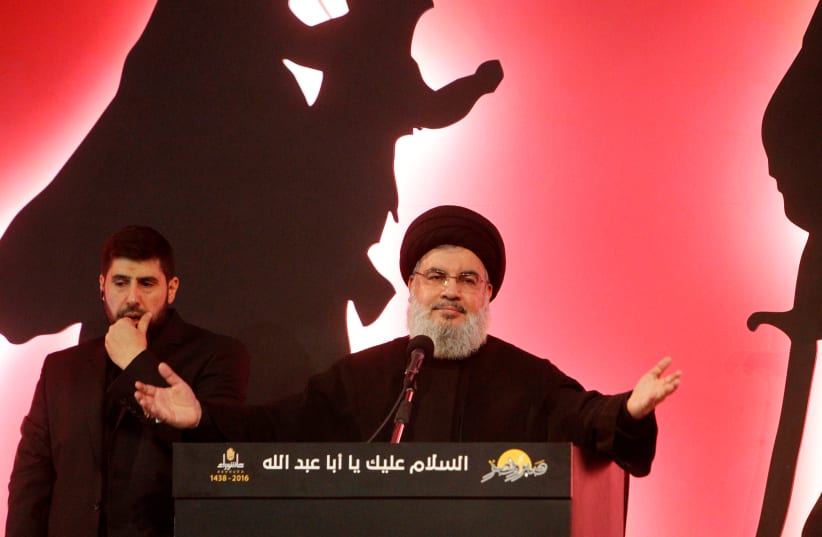Referencing a past incident, Nasrallah said, "When the Quneitra strike took place, the atmosphere was hot, we had six martyrs, but we waited 10 days, and now we are not in a hurry ... let us leave the Israelis on alert." The Hezbollah leader added that people can "sleep comfortably" as the terrorist group wouldn't be responding too quickly.
The statements were made during an internal meeting on Tuesday.
Hezbollah is insisting on carrying out a response "commensurate with the nature of the aggression," said sources close to Hezbollah, according to Al-Akhbar.
The delay in responding to the attacks on Hezbollah is only a tactic and a delay of a few days or more will not make it less severe.
According to the sources, Hezbollah's response will not consist of a retaliatory operation to strike a target or kill an Israeli soldier, but will instead aim at "establishing a new equation" based on ensuring that Israel will not be able to carry out any new violations of Lebanese sovereignty by land, air or sea.
Hezbollah is also not attempting to down all aircraft and will only shoot down some planes in order to restrict Israeli reconnaissance, said Nasrallah in the internal meeting on Tuesday. "If we have a specific weapon we will not use it up on drones."
Hezbollah's reponse to recent Israeli attacks will be an "appropriate surprise," said Naim Qassem, the terrorist group's deputy secretary general, in an interview with RT.
When asked about a possible response to the Israeli attacks, Qassem stated that Hezbollah does not talk about specifics and does not provide details that could help Israel.
Qassem stressed that the Israeli strikes cannot be treated as a "passing issue.""The atmosphere is one of a response to an attack, not an atmosphere of war," said Qassem.
The Hezbollah official referred to statements made by the Lebanese government as "correct" and stated that they will not wait for a response from the United Nations Security Council after Lebanon filed a complaint about the Israeli attacks.
Two drones which fell in Hezbollah's stronghold neighborhood of Dahiya in Beirut early Sunday morning were both armed with 5.5 kilos of C4 explosives and material targeted for precision guided missiles.
Hezbollah spokesman Muhammad Afif said Sunday that one Israeli drone exploded and caused significant damage to the group’s media office, wounding three people. The other drone crashed shortly afterwards, causing no damage.
On Saturday night, the IDF attacked an Iranian position south of the Syrian capital city Damascus, killing two Hezbollah militants and one Iranian planning to attack northern Israel with armed drones.
“What happened in Syria and Lebanon last night is very, very dangerous,” said Nasrallah in a speech on Sunday night, adding that Prime Minister Benjamin Netanyahu “would be mistaken if he thinks that this issue can go unnoticed. The time at which Israeli war jets used to strike targets in Lebanon while the usurping entity in Palestine kept safe has ended. From tonight, I tell the Israeli army on the border: wait for our response, which may take place at any time on the border and beyond the border. Be prepared and wait for us.”
The IDF began limiting traffic on roads along the Lebanese border on Tuesday morning over fears of retaliation by Hezbollah, as tensions remain high following the Israeli attacks.
Anna Ahronheim contributed to this report.
